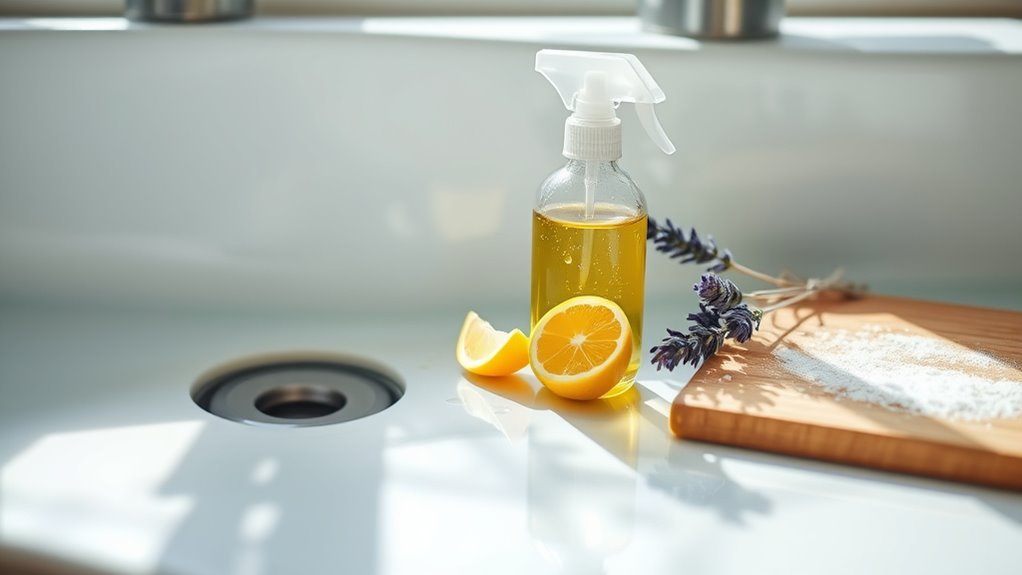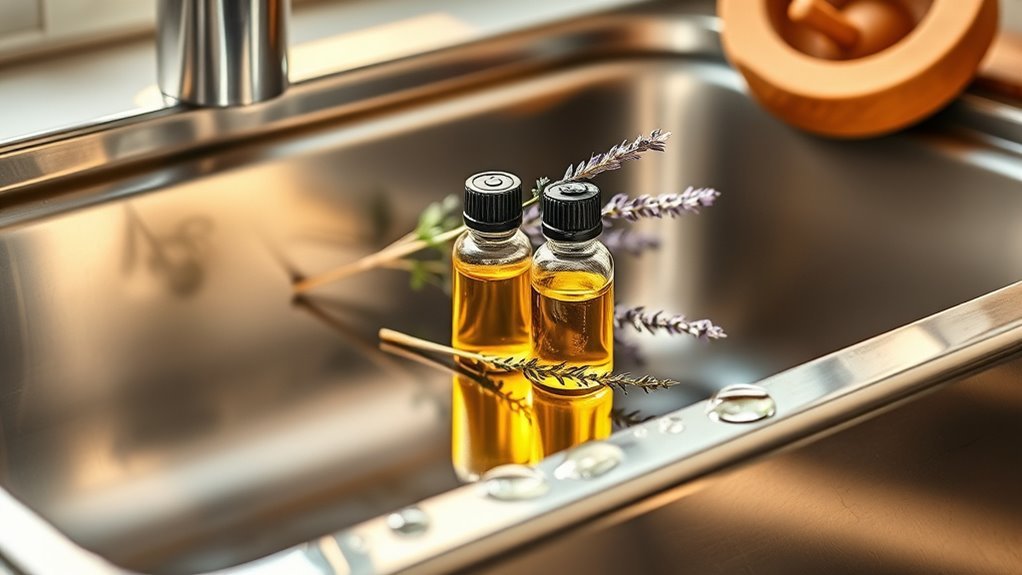Using Essential Oils to Clean Sink
You can clean your sink naturally by using essential oils, which avoid harsh chemicals and freshen the space with pleasant scents. Citrus oils like lemon cut grease, while tea tree or eucalyptus provide antibacterial properties. Mix 10-15 drops of your favorite oils with vinegar or baking soda to create a DIY cleaner. Simply apply, scrub, and rinse for a sparkling, toxin-free sink. Stick around if you want tips on choosing oils and maintaining a fresh, clean sink regularly.
Benefits of Using Essential Oils for Sink Cleaning

While you might think traditional cleaners are the best choice, using essential oils for sink cleaning offers unique benefits. You gain health benefits by avoiding harsh chemicals that irritate your skin and lungs, making your cleaning routine safer and gentler. Essential oils also act as natural disinfectants and deodorizes, keeping your sink fresh without toxic residues. Plus, they’re eco friendly alternatives, reducing your environmental footprint by using biodegradable, plant-based ingredients. Choosing essential oils means you’re embracing freedom from synthetic chemicals and harmful fumes, creating a healthier home and planet. By swapping conventional cleaners with essential oils, you take control of what touches your space, aligning cleanliness with nature’s power. It’s a simple shift that supports your well-being and respect for the Earth.
Choosing the Right Essential Oils for Your Sink
Since different essential oils offer unique properties, picking the right one for your sink is key to effective cleaning. If you want a fresh, invigorating vibe, citrus scents like lemon, orange, or grapefruit are fantastic. They not only leave your sink smelling clean but also naturally cut through grease and grime. For stealthy protection against germs, oils with antibacterial properties such as tea tree or eucalyptus are your best friends. These oils help keep your sink hygienic without harsh chemicals. You can even blend citrus scents with antibacterial oils to get the best of both worlds—clean, fresh, and germ-free. Choosing the right essential oils lets you take control of your space and cleaning routine, making your sink shine while staying true to your desire for a natural, free lifestyle.
How to Prepare a DIY Essential Oil Cleaning Solution

Now that you’ve chosen the perfect oils for your sink, it’s time to create a cleaning solution that puts their benefits to work. Start with a base like white vinegar or baking soda, which naturally tackles grime and odor. Then, add your essential oil blends—usually 10 to 15 drops per cup of liquid—to amplify cleaning power and introduce a rejuvenating scent. Popular DIY recipes combine lemon and tea tree oils for their antibacterial qualities or eucalyptus and peppermint for a fresh, invigorating aroma. Mix everything in a spray bottle or jar for easy use. Preparing your own solution means you control ingredients, avoiding harsh chemicals and embracing freedom in your cleaning routine. It’s simple, effective, and tailored to your preferences.
Step-By-Step Guide to Cleaning Your Sink With Essential Oils
Cleaning your sink with essential oils is easier than you might think. Embracing natural cleaning methods offers you freedom from harsh chemicals and connects you with eco friendly alternatives. Here’s a straightforward step-by-step guide to get you started:
- Gather your supplies: baking soda, white vinegar, and your favorite essential oil like lemon or tea tree.
- Sprinkle baking soda all over the sink, then spray vinegar to create a fizzing action that lifts grime naturally.
- Add a few drops of essential oil to a cloth and wipe down the sink for a fresh scent and added antibacterial power.
This method not only cleans effectively but also supports your desire for a toxin-free, sustainable lifestyle. Give it a try and enjoy a sparkling, naturally cleaned sink!
Tips for Maintaining a Fresh and Clean Sink Regularly

Although a thorough cleaning is essential, keeping your sink fresh and spotless every day requires simple, consistent habits. Start by rinsing your sink immediately after use to prevent buildup. Use natural freshening techniques like adding a few drops of your favorite essential oil—lemon or tea tree work great—into a spray bottle with water. Spray and wipe daily to maintain freshness. Incorporate sink maintenance tips such as wiping down the faucet and drain area regularly to avoid grime. Don’t forget to clean the sink strainer weekly to prevent clogs and odors. With these easy steps, your sink stays clean without extra hassle, giving you more freedom to enjoy your space rather than constantly scrubbing. Small, routine actions make a big difference in keeping your sink inviting.
Frequently Asked Questions
Are Essential Oils Safe for Septic Systems?
Think of your septic system as a delicate ecosystem, much like Pandora in Avatar. You’ll want to choose your essential oil types carefully to maintain septic system safety—oils like tea tree or eucalyptus can be harsh and disrupt beneficial bacteria. Instead, milder oils like lavender or lemon are usually safer. Don’t overdo it; moderation keeps your septic system happy, giving you the freedom to enjoy natural cleaning without worry.
Can Essential Oils Remove Tough Stains in the Sink?
You can definitely try natural stain removal with essential oil blends to tackle tough sink stains. While they might not be as powerful as harsh chemicals, certain blends—like lemon, tea tree, or eucalyptus—offer some stain-fighting properties and antimicrobial benefits. You’ll enjoy a fresher, chemical-free clean that aligns with your desire for freedom from toxins. Just remember, persistence is key; multiple applications often work best for stubborn marks.
How Long Does the Essential Oil Scent Last After Cleaning?
The scent of essential oils lingers like a gentle whisper in the breeze, offering a brief escape from the everyday. How long it lasts depends on the scent longevity and essential oil potency you choose. Typically, you’ll enjoy that fresh aroma for several hours, sometimes up to a day. If you want freedom from harsh chemicals and a lasting natural fragrance, picking high-quality oils helps keep your space smelling delightful longer.
Can Essential Oils Damage Sink Materials Like Granite or Stainless Steel?
You’ll want to be cautious about essential oil interactions with your sink’s surface since not all oils play nice with every material. For example, some oils can degrade granite sealants or dull stainless steel finishes. To keep your freedom to clean safely, always test a small spot first and dilute oils properly. Understanding sink material compatibility guarantees you enjoy the benefits without risking damage or costly repairs.
Are There Any Essential Oils to Avoid Using in Sink Cleaning?
Did you know that over 30% of essential oils on the market contain compounds that can be toxic if used improperly? When cleaning your sink, you’ll want to avoid toxic essential oils like cinnamon or clove, as their acidity can damage surfaces and reduce cleaning effectiveness. Stick to gentler oils like lemon or tea tree to keep things safe and effective, letting you enjoy a fresh, clean sink without any worries or restrictions.






